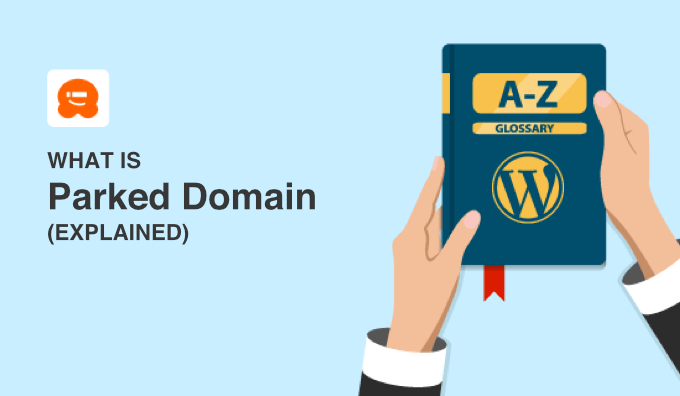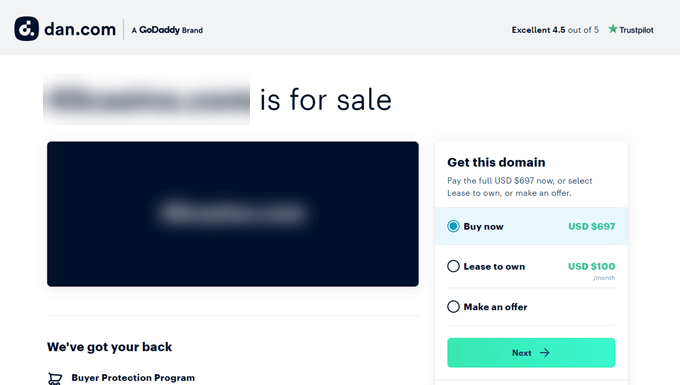The term ‘parked domain’ refers to a registered domain name that is temporarily ‘parked’ on a web server but isn’t an actual website. Basically, it’s like saving a seat for a future website to come and sit down.
In general, however, parked domains have a single landing page that users see that shows them that the space is taken.
Some of these web pages will also say the domain is for sale, or it could just be a temporary ‘coming soon‘ or ‘under construction’ notification.

How Does a Parked Domain Work?
Let’s say that you’ve registered the domain name ‘example.com’ and don’t want to immediately build a website. You might not even want to use it as your own domain or homepage.
In these situations, you can set it as a parked domain so that when someone types the web address into their web browser, they’ll see a specific landing page.

These are often provided by your domain registrar or web hosting provider like Bluehost, Hostinger, or GoDaddy.
If you don’t park the domain and someone visits the site, then the browser will simply return an error.
When Would You Want to Use a Parked Domain?
There are a lot of reasons why you would want to use a parked domain. Here are some of the most common:
- Domain Reservations: Parked domains are often used by businesses and individuals who want to secure a particular domain name for future use. It’s a way to prevent others from grabbing the domain before you are ready to launch your website.
- PRO TIP: You can use a parked domain with a coming soon page to build pre-launch buzz and collect leads to build your email list early!
- Brand Protection: Companies may park multiple TLD variations of their primary domain. They will send domains like .net, .org, or .io to specific landing pages to prevent competitors from registering them. This keeps others from using a domain parking service of their own or trying to make even more money through domain flipping or cybersquatting.
Note: Registering new domain name variations of someone else’s site and then trying to sell it to them for a higher price is considered cybersquatting, and you can get in legal trouble for that. Even if you don’t try to sell them the parked domain name, you can still be liable for infringement and impersonation.
- Monetization: In some cases, parked domains can be used for generating passive income. By displaying ads on the default parked page, domain owners can earn ad revenue when visitors click on them.
How to Set Up a Parked Domain
Setting up a parked domain is usually a straightforward process through your domain registrar or hosting provider.
You’ll typically need to access your web host’s site tools or cPanel and then find a section named something like ‘Parked Domains.’ You can then follow the host’s instructions to park your domain.
Some hosts might allow you to customize the parked page with your own company name or branding.
If not, you can use a page builder WordPress plugin like SeedProd to create one. In fact, SeedProd has special features designed just for coming soon pages and parked domains.
Other Parked Domain Considerations
While parking a domain is a pretty simple process, there are still a number of things to consider before doing so.
First, be sure that this specific domain’s DNS settings are correctly configured to point to the correct parked page. You don’t want your parked domain for a weight loss and fitness blog displaying enticing ads for a bakery website.
Second, always think about your branding. While parking a domain can be useful for future plans, often, a fully optimized landing page or single-page website can be even more powerful. Google and other search engines only rank quality content, and unfortunately, parked domains are considered thin content, which is bad for SEO.
Third, parked domains still have to be paid for. If you are a small business owner and want to reserve a URL for an upcoming site, then you still have to pay the domain registration fees for renewal. This is true even if the site stays parked on your hosting account for years before you build the site.
Using a parked domain is a strategic move that allows you to get your desired domain while you plan and prepare for the site launch.
We hope this overview has helped you understand what is a parked domain and how to use one. You may also want to see our Additional Reading list below for related articles on useful WordPress tips, tricks, and ideas.
If you liked this article, then please subscribe to our YouTube Channel for WordPress video tutorials. You can also find us on Twitter and Facebook.




